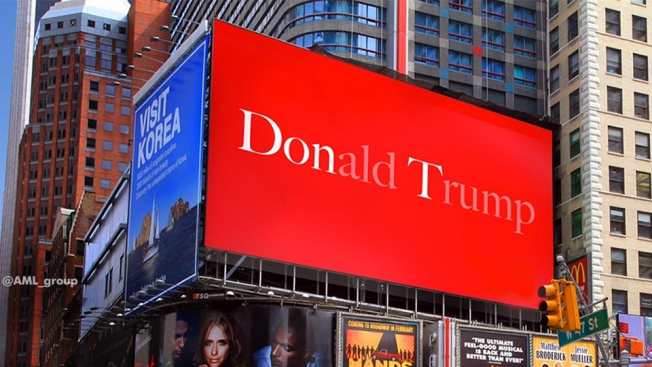
Today we were scrolling around our socnets when we saw something odd: Titled "Prize-winning piece of advertising from The Economist," the article weaving its way through our feed reflected a billboard that looked like a supplication not to vote for Donald Trump, smack in the middle of New York City, from one of the most well-regarded business magazines in the world.
On its face, this wouldn't be surprising: The dawning realization that Trump would carry the Republican nomination for president only sharpens when you consider how ambitiously weird, or just scary, his ideas are, especially in a debt economy. He recently claimed the U.S. can never default because it prints money, part of an overall "debt strategy" in which he mostly insisted debt is dangerous but he knows his way around it. (Decide the truth of that for yourself.)
Last year, The Economist also issued a warning on its cover about the rise of right-wing populism, an illustration of Trump's characteristic scowl leading equally sour shots of France's Marine Le Pen and Hungary's Viktor Orban.
So, we all know The Economist isn't keen on Trump for POTUS. But jumping into the fray with a billboard, in an active bid to affect the American vote, seems like a marked softening of the stiff upper lip for which the publication—and its mother country—is known.
Here's the actual story behind the ad.
Let's break the illusion now: It's not from The Economist. It comes from London agency AML, a quick and inspired Photoshop job by Stephen O'Neill for an internal creative award (which he won). And like ghost ads often do, the concept escaped: An agency staffer in Singapore got hold of it, and shared it with followers.
In the weekend that followed, it quickly spread from Asia to the U.S., making it the most widely shared story on The Poke and enjoying 36,000 shares on Facebook alone.
Still, what made it fly so far?
Something looks off about it; better ghosts have been squashed before even making it past their agency doors. The typeface is different from The Economist's custom type family—making it look different from past ads—and it doesn't even have a logo. Highlighting a plea in a candidate's name seems less witty than it does folksy, and anybody can Photoshop an idea onto a billboard. The improbability of The Economist actually having run it is only slightly tempered by the fact that, days later, it ran a cover story on why a Donald Trump presidency would be bad news.
"It's a simple idea that sums up a complicated political issue," says AML, "which is what we do at AML—it's good the world (mostly) agrees. Even The Economist was heard to chuckle."
Nothing surprising there, either. It's never been a secret that lots of people are freaked out about how far Trump has come. Making fun of him has become standard operating procedure, and there's even an anti-Trump Cards Against Humanity expansion pack.
Maybe the real reason this ad flew so far, so fast, is that it reflects a tangible concern shared not just internationally but by Americans. The notion that The Economist might run it legitimizes that concern: It makes a lot of well-read people feel sane.
The thing is, it isn't clear whether that's enough to stop the train. As we draw nearer to the end of this year, it grows harder to believe that we'll score a Trump equivalent of Tina Fey to smack an aggressive pro-Trump voting public into awareness.
A lot's changed in eight years. We're more jaded now; we take it for granted that politics and entertainment hold hands. A different faction of America is angrier than Obama's voting public was then, and it doesn't matter what Trump himself does; one public's growing alarm is another's fuel.
What'll decide this election is money—lots of money—and votes, not just from disillusioned Republicans but from a Democratic party that remains fractured between Hillary Clinton and Bernie Sanders.
Because in a political climate as strange as the one we've cultivated, a powerful ghost ad is simply that—the ghost of a kind of culture-savvy influence peddling that used to work, but just won't cut it this time. Or at least, not against this particular opponent, who appears to know the ropes better than most.